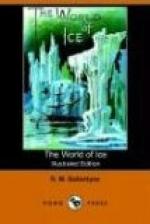The longed-for hour came at last. The cabin tables having been removed, and rows of seats placed in front of the stage, the men were admitted from the deck, to which they had been expelled an hour previous in order not to impede preliminary arrangements. There was great joking, of course, as they took their seats and criticised the fittings up. David Mizzle was of opinion that the foot-lights “wos oncommon grand,” which was an unquestionable fact, for they consisted of six tin lamps filled with seal-oil, from the wicks of which rose a compound of yellow flame and smoke that had a singularly luminous effect. Amos Parr guessed that the curtain would be certain sure to get jammed at the first haul, and several of the others were convinced that O’Riley would stick his part in one way or another. However, an end was put to all remarks and expectation raised on tip-toe by the ringing of a small hand-bell, and immediately thereafter a violent pulling at the curtain which concealed the stage. But the curtain remained immovable (they always do on such occasions), and a loud whispering was heard behind the scenes.
“Clap on extra tackle and call all hands to hoist away,” suggested one of the audience.
The laugh with which this advice was received was checked in the bud by the sudden rising of the curtain with such violence that the whole framework of the theatre shook again.
For a few seconds a dead silence reigned, for the men were stricken dumb with genuine amazement at the scene before them. The stage was covered with white sheets arranged in such a manner as to represent snow, and the more effectually to carry out the idea several huge blocks of real ice and a few patches of snow were introduced here and there, the cold in the after part of the cabin being too great to permit of their melting. A top-gallant-sail, on which were painted several blue cracks, and some strong white lights did duty for an iceberg, and filled up the whole back of the scene. In front of this, in the centre of the stage, on an extemporized hummock, sat Peter Grim, as the Giant Blunderbore. His colossal proportions were enhanced by the addition of an entire white bear-skin to his ordinary hairy dress, and which was thrown round his broad shoulders in the form of a tippet. A broad scarlet sash was tied round his waist, and a crown of brown paper painted in alternate diamonds of blue, red, and yellow sat upon his brow. Grim was in truth a magnificent-looking fellow, with his black beard and moustache; and the mock-heroic frown with which he gazed up (as one of the audience suggested) at the aurora borealis, while he grasped an enormous club in his right hand, became him well.
The first few seconds of dead silence with which this was received were succeeded by a long and loud burst of applause, the heartiness of which plainly showed that the scene far exceeded the expectations of the men.
“Bravo!” cried the captain, “excellent! nothing could be better.”




